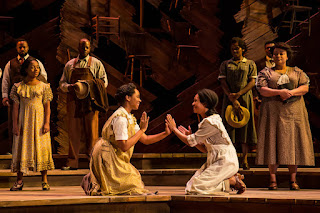The Color Purple
As part of the Smith Center's Broadway series, The Color Purple was in Las Vegas last weekend and I took it in. I was very much impressed, if not completely bowled over.
This is the revival that won the Tony last year, and is said to be better than the original production (which I didn't see). The staging is simple but elegant, with just a plywood floor in levels and a plethora of chairs hung on the back wall, for use throughout the night. That's the only set.
I haven't read Alice Walker's novel, but I did see Steven Spielberg's film when it came out over thirty years ago, but I forgot much of the plot. Basically it's about forty years in the life of Celie, a woebegone black woman in the post-Civil War/pre-Civil Rights south. She is basically a slave and concubine for her stepfather (she has two children by him before she is fifteen). She is devoted to her sister Nettie. A farm owner, known to Celie only as Mister, wants to marry Nettie, who is the prettier of the two, but he ends up with Celie, even though he finds her ugly.
Life for Celie is hard. She is regularly beaten and is disheartened that she has not received any letters from Nettie. We are introduced to a few other characters, notably Sofia, who is a woman who doesn't take any shit. She is married to Harpo, Mister's son, and when Harpo is advised to beat her, she beats him up instead. Shug Avery is Mister's lover--he wanted to marry her, but his father wouldn't let him. She and Celie form a close bond with a hint of lesbianism.
Shug gives Celie letters that Mister had kept hidden, and she learns Nettie is in Africa as a missionary. Given this information, we wait until they are reunited--to deny us that would cause severe audience dismay.
The music is by Brenda Russell, Allee Willis, and Stephen Bray, and while I enjoyed it I don't remember any of the numbers three days later. Looking at the program, I enjoyed Sofia's "Hell, No!" a kind of anthem of what is sometimes unfairly perceived at black woman "sass." A number by men in Harpo's juke joint, the salacious "Brown Betty," is also very good. The book is by Marsha Norman, who is white. I find it interesting and wonder if a production like this wouldn't use a black playwright in this day and age (I don't think Spielberg could make the movie--there was some controversy back then, but it would be an outcry today).
What impressed me the most about The Color Purple is the talent of the performers. It never ceases to amaze me that even those in touring companies are brilliant singers, dancer, actors, or all three. This cast is uniformly excellent, starting with Adrianna Hicks as Celie, Carrie Compere as Sofia, and Gavin Gregory as Mister, who is convincing in his change of heart.
This is the revival that won the Tony last year, and is said to be better than the original production (which I didn't see). The staging is simple but elegant, with just a plywood floor in levels and a plethora of chairs hung on the back wall, for use throughout the night. That's the only set.
I haven't read Alice Walker's novel, but I did see Steven Spielberg's film when it came out over thirty years ago, but I forgot much of the plot. Basically it's about forty years in the life of Celie, a woebegone black woman in the post-Civil War/pre-Civil Rights south. She is basically a slave and concubine for her stepfather (she has two children by him before she is fifteen). She is devoted to her sister Nettie. A farm owner, known to Celie only as Mister, wants to marry Nettie, who is the prettier of the two, but he ends up with Celie, even though he finds her ugly.
Life for Celie is hard. She is regularly beaten and is disheartened that she has not received any letters from Nettie. We are introduced to a few other characters, notably Sofia, who is a woman who doesn't take any shit. She is married to Harpo, Mister's son, and when Harpo is advised to beat her, she beats him up instead. Shug Avery is Mister's lover--he wanted to marry her, but his father wouldn't let him. She and Celie form a close bond with a hint of lesbianism.
Shug gives Celie letters that Mister had kept hidden, and she learns Nettie is in Africa as a missionary. Given this information, we wait until they are reunited--to deny us that would cause severe audience dismay.
The music is by Brenda Russell, Allee Willis, and Stephen Bray, and while I enjoyed it I don't remember any of the numbers three days later. Looking at the program, I enjoyed Sofia's "Hell, No!" a kind of anthem of what is sometimes unfairly perceived at black woman "sass." A number by men in Harpo's juke joint, the salacious "Brown Betty," is also very good. The book is by Marsha Norman, who is white. I find it interesting and wonder if a production like this wouldn't use a black playwright in this day and age (I don't think Spielberg could make the movie--there was some controversy back then, but it would be an outcry today).
What impressed me the most about The Color Purple is the talent of the performers. It never ceases to amaze me that even those in touring companies are brilliant singers, dancer, actors, or all three. This cast is uniformly excellent, starting with Adrianna Hicks as Celie, Carrie Compere as Sofia, and Gavin Gregory as Mister, who is convincing in his change of heart.



Comments
Post a Comment